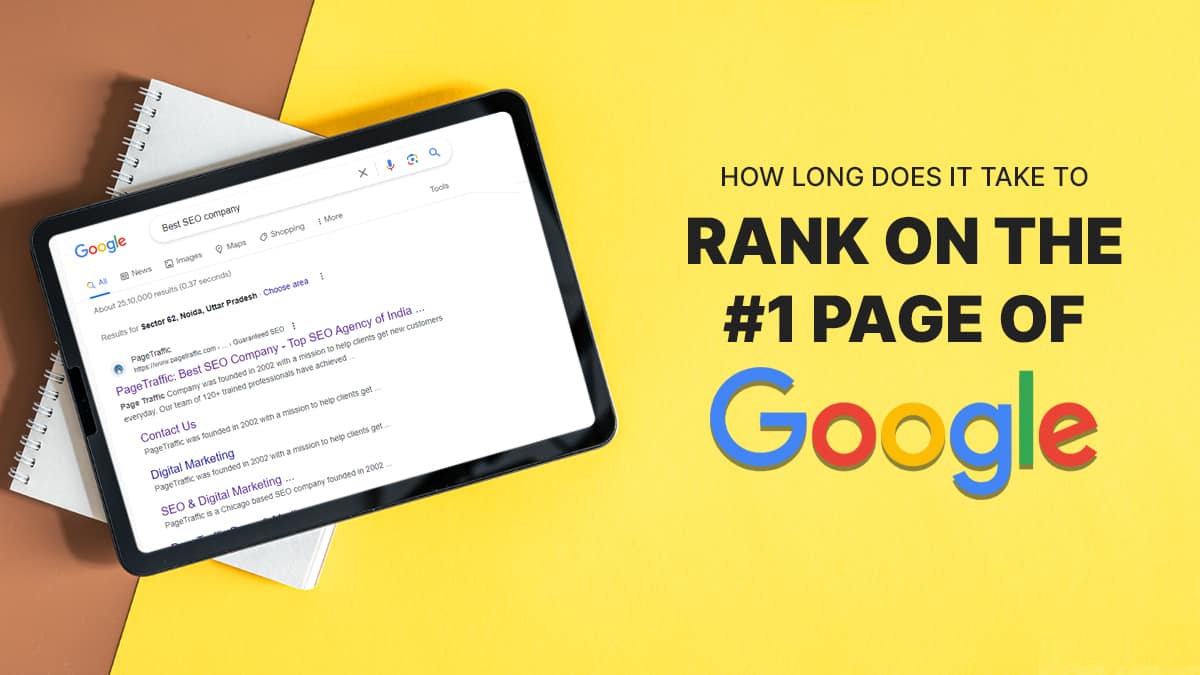Every digital marketer’s burning question is: How long does it take to rank on the first page of Google? It’s the holy grail of the online world, guaranteeing visibility, traffic, and, ultimately, revenue. However, in the ever-changing landscape of search engine optimization (SEO), reaching that coveted spot is more complex than ever.
Rankings depend on a myriad of factors, from keyword competition and on-page optimization to the domain’s age and backlink profile. Amid a sea of conflicting information, generalized timelines, and one-size-fits-all answers, this article aims to provide clarity and practical insights.
Let’s delve into the intricacies of Google’s algorithm, debunk common myths, and set realistic expectations for your SEO journey. So, grab a cup of coffee, and let’s embark on a journey to demystify the timeline to Google’s first page.
The Key to Ranking on Google’s First Page: Time
Time does play a significant role in ranking on the first page of Google. A recent study found an intriguing pattern: customers who had been with a business for a long time had more blog entries that appeared on the desired top page.
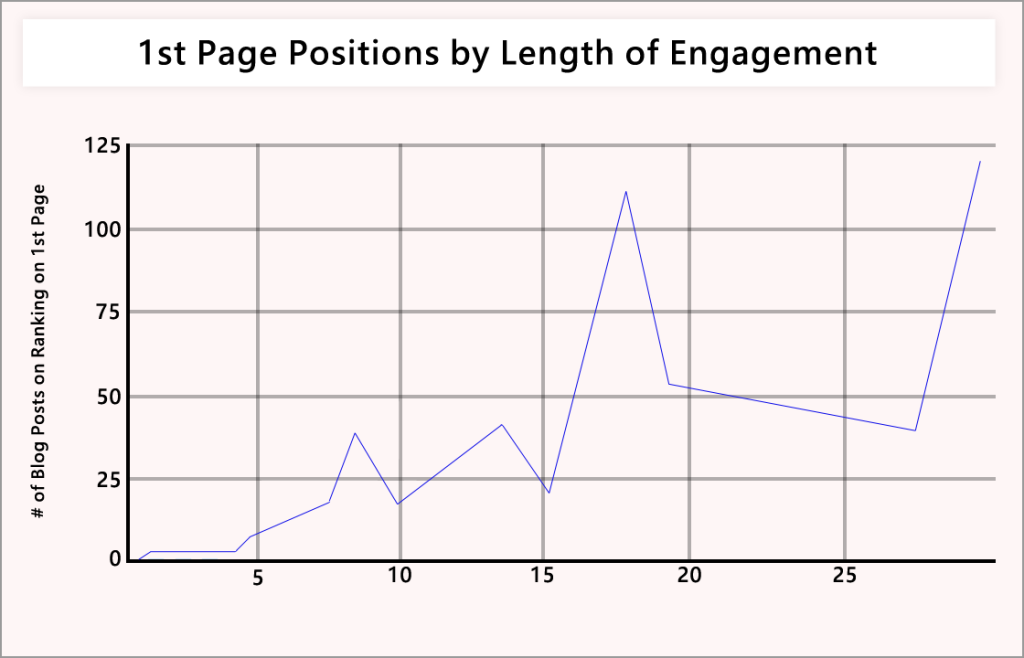
Google’s primary goal is to provide users with the most relevant search results. A website’s reputation and quality are important. Google favors websites with excellent content and a solid track record of dependability. This evaluation is based on other variables, such as domain authority and backlinks.
Recent studies have cast doubt on the conventional wisdom that domain authority and backlinks are the only factors determining SEO performance. It implies that time, along with other factors, affects search ranks. So, the notion that these are the sole components required for SEO success is being questioned.
A website’s credibility and quality are crucial. Google prefers websites with great content and a reputation for being reliable and trustworthy. The availability of inbound links from other reliable websites impacts this evaluation.
The user experience is of utmost importance. Google wants to direct people to websites with quick page loads, flawless mobile functionality, and simple navigation. User satisfaction significantly affects rankings.
When evaluating your website’s authority, backlinks are essential. However, the quality of the backlinks is even more important than the quantity. You must obtain links from trustworthy and relevant websites to significantly impact your results.
It’s debatable whether social media directly impacts search engine rankings, but maintaining a strong presence on all major social networks can benefit your website in other ways. By creating a robust social media presence, you can increase your visibility and attract organic traffic to your website, possibly enhancing your search engine performance.
User engagement is another factor that search engines consider, in addition to backlinks and social media. Metrics like click-through rates, bounce rates, and time spent on a page provide insightful indicators of value and relevance. Freshness can also contribute to some materials. Current and relevant information can give you an edge in search queries.
Therefore, while a website’s age and the length of time Google has indexed it do have some influence, they are not the primary criteria. Instead, focus on producing top-quality content, improving your website, establishing your website’s authority through backlinks, and ensuring a great user experience. These are the essentials for increasing your likelihood of ranking highly on Google.
Website owners should actively engage with their SEO agency, asking them to elucidate the various factors that contribute to high Google rankings. A transparent conversation ensures better understanding and sets realistic expectations for the site’s SEO journey.
The Sad Truth: New Posts Take 5 Months to Reach Page 1
Getting a new post to appear on page 1 of search results can take anywhere from a few days to several weeks. Since every situation is unique, there isn’t a fixed timeframe that applies to all cases. It’s important to remember that reaching page 1 often requires considerable time and effort, including consistent optimization, high-quality content, and effective promotion.
In some cases, particularly for less competitive keywords or niche industries, a well-optimized and highly relevant post may start ranking on page 1 within a few weeks or months. However, for more competitive keywords and industries, it may take several months or even longer to see significant results.
Various factors influence how long it takes for a new article to appear on page 1 of search results, including domain authority, competition, backlink profile, content quality, user engagement, and relevancy. SEO is a long-term process that requires ongoing effort. To increase your chances of ranking on page 1, consistently produce valuable content, optimize for relevant keywords, develop a robust backlink profile, and engage with your audience.
Grow and Convert conducted a fascinating research on how long it typically takes for a new post to appear on page 1 of search results. They found that, on average, it takes a post about five months to reach that coveted spot. This finding applies to all posts, regardless of the total number of posts published by a user. Unfortunately, these posts usually need additional support to rank on page 1 for their targeted keywords during the first five months, which is undoubtedly a disappointing reality.
Also Read: Google Penalty Check and How to Fix if Your Website is Penalized by Google
The Great News: Almost Every Post Will Reach Page 1 in Approximately One Year
Fortunately, our clients can expect to see noticeable improvements in their keyword performance within about a year. Our approach involves sending a set number of articles to clients each month. With this strategic method, companies can anticipate ranking on the first page for over 30 highly profitable keywords—those likely to attract new clients and lead to conversions—within the first year of our partnership.
Consider the advantages of ranking for a broad range of SEO terms that indicate a strong intent to purchase your products or services. These specific search keywords demonstrate a clear demand for what you offer. Within a year, we aim to ensure that your website appears prominently on the first page of search engine results for each of these keywords.
This information is invaluable in helping our clients set realistic expectations. It considers both the pros and cons of the process, enabling our clients to maintain reasonable near-term expectations while also understanding the potential long-term opportunities resulting from our collaboration.
Do Industry and Domain Authority Really Matter?
It is incredibly interesting to observe the common phenomenon known as time-to-rank across companies operating in various industries, from software firms providing help desk solutions to marketing agencies leading advertising campaigns and specialized cancer hospitals. Despite the differences in search volumes, keyword competitiveness, domain authorities, domain ages, and other influencing factors, all these businesses exhibit a similar time-to-rank pattern.
There may be minor discrepancies in the data, but overall, the experiences of these businesses are remarkably similar. This observation highlights the fundamental principles of search engine optimization and the factors that influence website rankings. Despite their distinct characteristics, these businesses successfully navigate the challenges of establishing a strong online presence and achieving high search engine rankings.
Domain Authority Doesn’t Determine How Long It Takes to Rank
The widely accepted notion that domain authority, or domain rating, is vital for SEO ranking is challenged by the startling lack of outliers in terms of page 1 positions achieved by clients. Although domain authority is generally regarded as a key factor, it does not directly influence the time it takes for a website or webpage to rank well in search engine results.
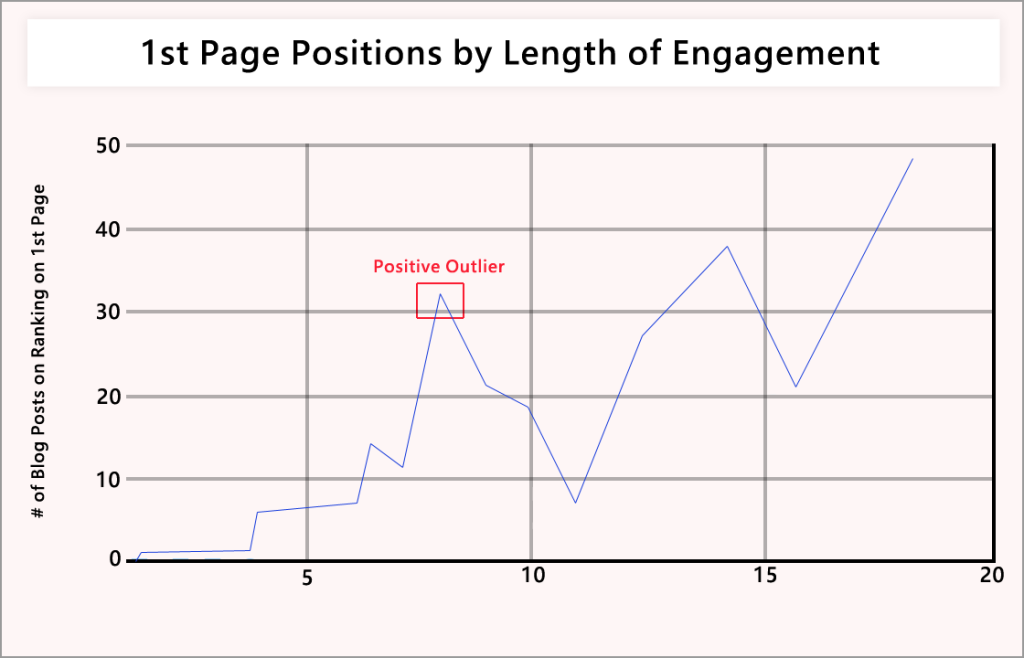
The Moz-developed domain authority metric assesses a domain’s overall strength and authority based on factors such as backlinks and SEO-related considerations. A higher domain authority usually suggests a greater likelihood of securing good rankings.
Domain authority is just one of many factors that search engines consider when determining rankings, and it is important to bear this in mind. Other factors, including competition, content quality and relevance, on-page optimization, backlinks, user experience, and overall SEO strategy, influence how long it takes to achieve good rankings.
The level of competition significantly affects ranking timescales in a specific sector. A website may take longer to rank well in highly competitive industries, even with a high domain authority. Search engines prioritize websites with excellent, relevant content that satisfies user intent. Rankings are also influenced by on-page optimization, such as enhancing title tags, meta descriptions, and headings, which can have a more immediate impact than domain authority alone.
Various off-page factors, like the type and number of backlinks, also affect rankings. Building a diverse and influential backlink profile is crucial for increasing your search visibility. Search engines also consider user experience and website performance, including elements like site speed and mobile-friendliness.
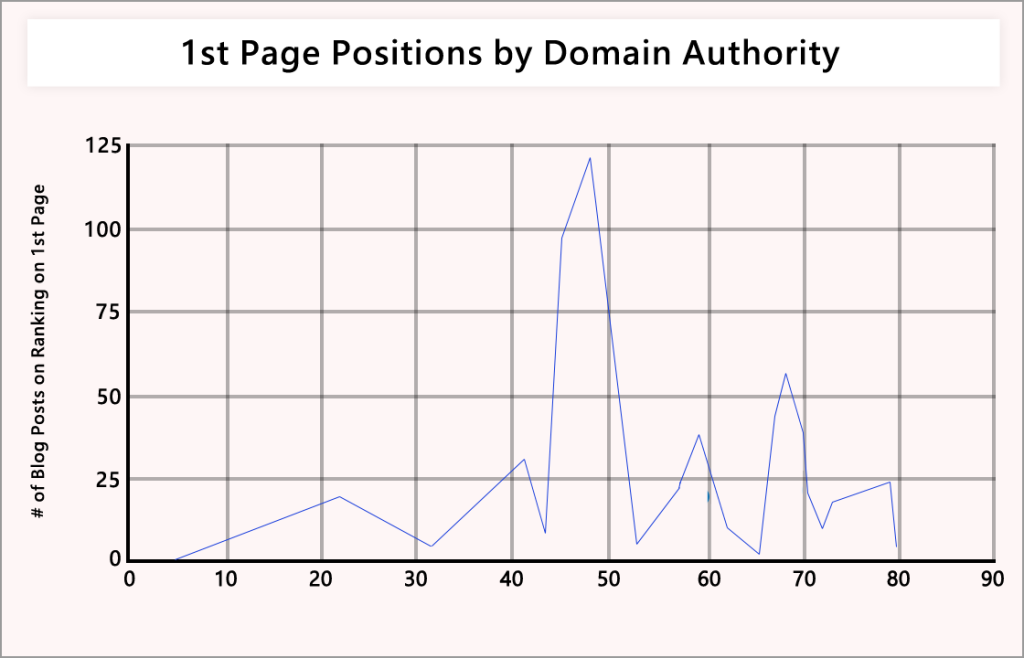
For websites to rank higher, SEO efforts such as link building, technical optimization, and keyword research must be effective and consistent. Although domain authority provides insight into a domain’s authority and ranking potential, it does not directly influence how quickly one can achieve high rankings in search results.
The notably low number of outliers challenges the idea that domain authority is the sole factor affecting SEO rankings in terms of page 1 ranks achieved by clients. While domain authority is important, other factors such as competition, content quality and relevance, on-page optimization, backlinks, user experience, and overall SEO strategy also play a role in how long it takes to rank.
Now, let’s delve into why we believe that.
Important Lesson: The Importance of Relevant Topics
The importance of subject relevance on search engine results and overall online visibility is a critical lesson learned by website owners and digital marketers in the field of search engine optimization (SEO). This key insight underscores the importance of developing and optimizing content that closely relates to the topics and themes that matter to their target audience.
The veracity of a statement and questioning the relevance of domain authority are two crucial considerations. Although domain authority has long been regarded as a significant SEO criterion, there is a growing awareness that it is not the only factor in rankings. A more successful approach is gaining popularity—pursuing keywords directly related to clients’ products for strong topical relevance within their specific domains. Instead of targeting highly competitive keywords with substantial search traffic, this approach focuses on selecting terms with strong buying intent.
Another misconception is that Google’s algorithm favors authoritative websites on a particular subject over the quantity of backlinks. This means that having high-quality, relevant content that demonstrates expertise and authority on a specific subject is essential for SEO success.
The Ahrefs blog is often cited as an example in discussions about subject relevance in the SEO community. Ahrefs has established a solid online presence by regularly publishing in-depth, informative articles on SEO-related topics. Their success illustrates how emphasizing topical relevance can lead to improved rankings and increased visibility.
Moreover, it has been demonstrated that customer posts may outrank competitors with higher domain authority, underscoring the importance of topical relevance and consistency over domain authority alone. This suggests that search engines are placing increasing emphasis on actual content and its alignment with user intent, rather than relying solely on a website’s domain authority.
The most crucial lesson in SEO is the importance of topical relevance. By understanding and incorporating topical relevance into your content creation and optimization efforts, questioning the veracity of claims, challenging the importance of domain authority, and focusing on keywords with strong buying intent, you can improve your search engine rankings, attract targeted organic traffic, enhance user experience, build authority, and achieve long-term SEO success.
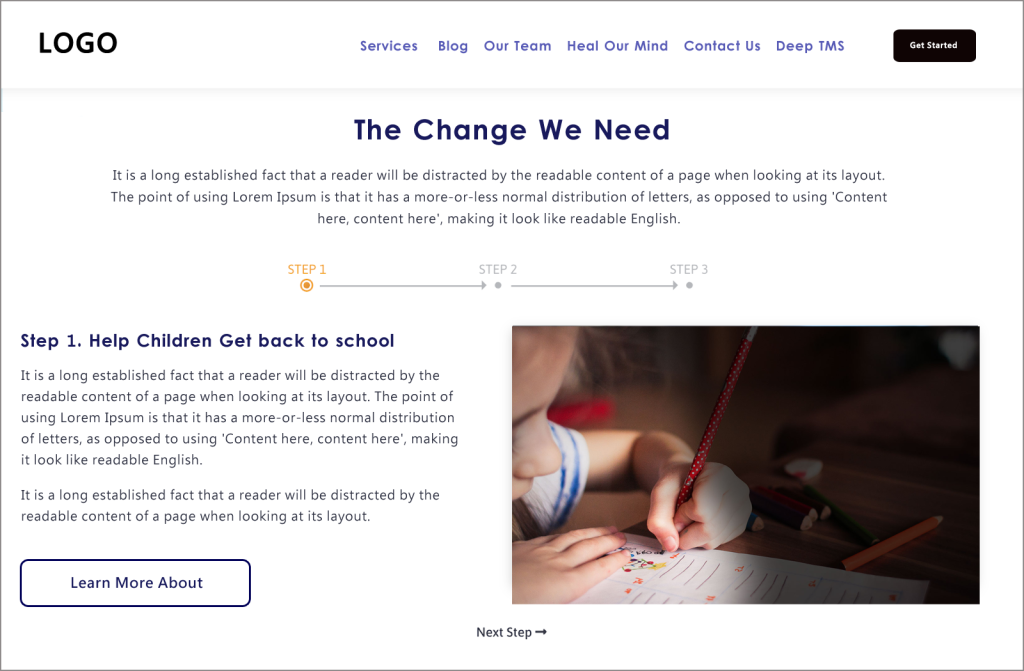
Therefore, this suggests that while domain authority still holds some significance, it is not necessary to obsess over obtaining backlinks from high domain authority websites if you focus on targeting bottom-of-the-funnel keywords closely related to your product or industry. This is because being thematically relevant to those keywords is already advantageous.
Also Read: 29-Step Small Business SEO Checklist To Improve Rankings (Infographic)
How Many Leads Does This Generate?
The definition and importance of lead-generating tactics vary among businesses. Leads may encompass various actions, including requests for demos, free trials, and sales forms. The duration of the engagement frequently affects the number of leads generated; longer engagements typically yield more leads.
Businesses utilize platforms such as Twitter Ads, Google Ads, and Facebook Ads to enhance the reach and effectiveness of lead generation. The first six months are crucial for paid promotions to generate leads from blog posts successfully. There are compelling instances where paid promotion has generated leads, showcasing its potential value.
Content marketing can generate leads even before achieving high positions on search engines like Google. It is essential to set realistic expectations for content marketing, as reaching high rankings takes time. However, content marketing has significant long-term potential. For efficient lead generation, it is necessary to include relevant keywords in addition to domain authority.
Lead generation involves various activities and holds different values for different businesses. More extended interactions typically result in more leads. Businesses employ platforms like Twitter Ads, Google Ads, and Facebook Ads to optimize lead generation.
Paid promotions can successfully generate leads from blog posts in the early stages, and content marketing can do so even before attaining high search engine rankings. The key to effective lead generation is prioritizing relevant keywords and setting realistic expectations.
Conclusion
Finally, please heed this reminder! Implementing the tips from this post will assist you in establishing realistic content marketing goals. Bear in mind:
Rankings take time to develop. Regrettably, you cannot expect a significant surge in traffic, top rankings, and a plethora of leads in just three months. Patience and time are required for this channel to yield meaningful results.
But hold on, do not despair! The potential is remarkable. Imagine your website dominating the first page of search results in a year for highly valuable keywords related to your business. The visibility and potential to convert leads into paying customers are astounding.
Here’s a crucial point: don’t obsess over your domain authority. Instead, target keywords that are specifically pertinent to your niche and closely related to your product or service. This approach will attract the right audience and increase your chances of securing their business.
Oh, and here’s a little secret ingredient: consider using sponsored promotion to bolster your SEO efforts, especially in the early months when organic results may not be significant. It’s a smart strategy to build momentum as you ascend the search results page.
Remember this advice!
FAQs
What factors influence how long it takes to appear on Google’s first page?
The difficulty of the keyword or phrase, the value and relevance of your content, the strength of your website’s backlink profile, and the domain’s overall authority all affect the ranking time.
Is there a deadline for appearing on Google’s first page?
There is no fixed timeframe for appearing on Google’s front page. It may take a few weeks, several months, or even longer, depending on the aforementioned factors.
Are there any quick fixes or shortcuts to appear on Google’s first page?
Since Google’s algorithms prioritize high-quality and relevant content, there are no guaranteed ways to rank on the first page. Attempts to manipulate the system using black-hat techniques can result in penalties and harm your website’s ranking.
Can paid advertising help rank higher on Google’s first page faster?
Paid advertising, like Google Ads, can place you directly on the front page of search results. However, it does not directly impact organic rankings. The quality and relevance of your content determine your organic rankings.
